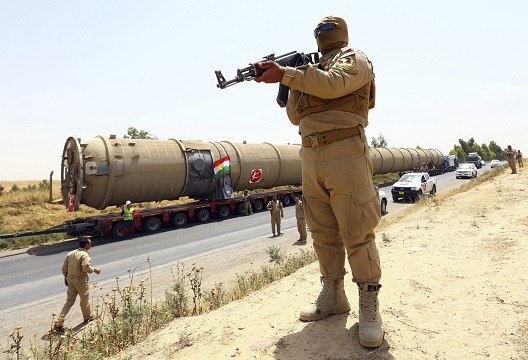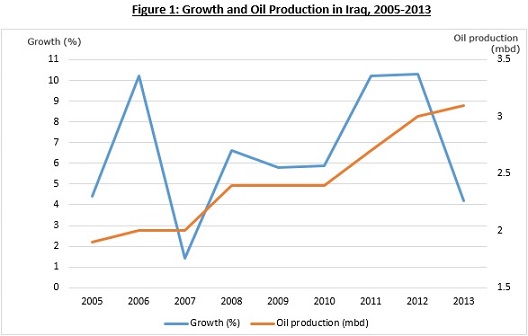 As the jihadists of the Islamic State, formerly known as the Islamic State of Iraq and al-Sham (ISIS), capture more and more territory in Iraq, the question on the minds of observers is what will become of the Iraqi state? The countries in the region and the broader international community have been focusing on the dangers the Islamic State advances pose for security and for political and geopolitical stability. But there will be an economic fallout as well. If the Iraqi economy were to deteriorate significantly, this would add to political instability and greater insecurity in Iraq and its neighbors.
As the jihadists of the Islamic State, formerly known as the Islamic State of Iraq and al-Sham (ISIS), capture more and more territory in Iraq, the question on the minds of observers is what will become of the Iraqi state? The countries in the region and the broader international community have been focusing on the dangers the Islamic State advances pose for security and for political and geopolitical stability. But there will be an economic fallout as well. If the Iraqi economy were to deteriorate significantly, this would add to political instability and greater insecurity in Iraq and its neighbors.
To determine the potential impact of the Islamic State gains and the continuing fighting, one has to understand the basic structure of Iraq’s economy, characterized by two main features:
- Oil is the mainstay of the economy. Iraq’s oil reserves are estimated to be 143 billion barrels, the fifth largest in the world and the highest in the Middle East after Saudi Arabia and Iran. The current rate of oil production is over 3 million barrels a day (mbd), the second highest in the Middle East below only Saudi Arabia. Oil accounts for 54 percent of the country’s GDP of some $230 billion, 99 percent of exports, and 93 percent of government fiscal revenues. Despite the fact that the oil industry accounts for more than half of the total economy, the sector is highly capital-intensive and employs only about 1 percent of the Iraqi labor force of over 8 million.
Because of this high degree of oil dependency, production and world market prices essentially drive the Iraqi economy. When oil production started to increase rapidly in 2011-2012, and growth shot up above 10 percent (Figure 1). At the same time, growth is also sensitive to the security situation, as was seen in 2006 and then in 2013.

- Iraq has a state-dominated economy. The oil sector is an enclave and almost all oil revenues from foreign and domestic sales of oil accrue to the government. The non-oil economy is only affected when the government spends these revenues. Therefore, through its control over the oil sector, the government influences virtually all economic activity in the country. The private sector plays a secondary and minor role.
Aside from oil, state-owned enterprises (SOEs) operate in the agriculture, trading, and manufacturing sectors. Since these SOEs are highly subsidized and supported by large transfers from the government, the private sector is put at a disadvantage and cannot compete and develop. Furthermore, the government has constrained the private sector through myriad and complex regulations covering the starting and operating of businesses, as well as limiting their access to credit. The World Bank’s 2014 Doing Business Report, which ranks Iraq 151 out of 189 countries, confirms the Iraqi government’s antipathy towards the private sector.
Further evidence on the major role of the government in the economy can be found in the labor market. The public sector employs about 40 percent of the labor force, offering greater job security and more generous pay and benefits than the private sector. Since alternatives to government employment are limited, the unemployment rate hovers at around 15 percent. There are also considerable differences in the unemployment rates across provinces. In some provinces, notably in the Sunni-majority ones like Anbar, the unemployment rate is estimated to be twice the national rate. It is clear that the government has strongly favored its Shiite population using public sector employment as a form of patronage. Besides political marginalization, the Sunni population has legitimate economic grievances, which the Islamic State has been able to tap into.
In sum, the structure of the Iraqi economy is largely unchanged from the end of the US occupation in 2004. The Coalition Provisional Authority (CPA) had a grand vision of Iraq being transformed into a vibrant, diversified, and modern economy led by the private sector, and outlined the economic and institutional reforms that would bring about this outcome. Iraq today still depends almost exclusively on oil and the state still dominates the economy, a picture virtually unchanged from the economy of Saddam Hussein days. The government has not implemented any major economic reforms or developed economic institutions over the past decade to achieve what the CPA envisioned. Undoubtedly, the CPA’s policies to transform Iraq have been an abject failure.
Since Iraq remains a one-product economy, fighting with the Islamic State will affect the economy through disruptions of the oil sector. Were there to be a significant drop in Iraq’s oil production, the effects on the Iraqi economy would be devastating. One could find an analogous example in the case of Libya, where the economy went into a freefall in 2011 as the uprising to overthrow Muammar Qaddafi resulted in a sharp cut in oil production. The drop in oil production from 1.6 mbd in 2010 to less than 0.5 mbd in 2011 led to overall GDP being more than halved (from $75 billion to $35 billion)—a catastrophic collapse of GDP by any standard. Over the past year, as militias fight to achieve their political aims and oil production has fallen dramatically, the Libyan economy is once again experiencing an economic meltdown.
Could the Libya scenario emerge in Iraq? As yet, the Islamic State has not taken control of any significant part of Iraq’s oil facilities. It has captured some small oil fields and Iraq’s largest oil refinery in Baiji, which supplies most of the gasoline and diesel for the northern part of Iraq. More significantly, Kurdish forces now have complete control of the giant Kirkuk oil field. If the Kurds hold on to Kirkuk, Iraq would lose about a quarter of its oil production. In addition, the Kirkuk-Ceyhan pipeline, which has a capacity of 1.6 mbd, has been shut down due to frequent attacks since March this year and exports from the northern oil fields of Iraq have been sharply curtailed.
While serious, Iraq can still manage effects of this loss of oil production. Real GDP, which only recently was expected to grow by 6 percent in 2014, will now likely either remain flat or fall by 2-3 percent. The reason the decline is not larger is that about three-quarters of Iraq’s oil production is in the southern part of the country where most of the Shiite population that support the government live. Foreign oil companies have played a major role in developing and rehabilitating the southern oil fields and most of Iraq’s oil flows through the oil terminals of the port city of Basra on the Gulf. In addition, the government is spending some portion of its $80 billion of international reserves to compensate for the loss of oil export revenues from the northern part of the country.
As long as the ongoing war with Islamic State does not escalate further, and the Kurds stay part of the Iraqi state, the economy will likely be able to cope. In Iraq, like in other Middle East oil producers, as goes oil so goes the economy. The government does not have to do much to keep the economy moving along at a steady, perhaps low, pace as it has a momentum of its own based on oil production and world oil prices. This is the optimistic and relatively benign scenario.
But the potential for a more pessimistic grim scenario cannot be excluded. The country could be divided between the Shiites, Sunnis, and Kurds, with each of these three parties controlling the areas where they maintain a majority. This splitting of the country is unlikely to happen peacefully. The Kurds could declare and independent state, leaving the Iraq government and the Islamic State to battle it out on what parts of the country each would rule over. The resulting full-blown sectarian civil war would be devastating for Iraq. In this scenario, Iraq could wind up looking not like Libya but more like Syria, where the economic costs of civil war are nothing short of staggering.
While the odds still favor a variant of the optimistic scenario, the probability of the pessimistic scenario in some form is not so small that it can be safely ignored. The attention so far has been on security and politics. Ignoring the economics is a mistake. All three aspects have to be considered together. If the Shiite-led government in Iraq is to make peace with the Sunni population, and defeat the Islamic State, it will have to adopt both political and economic inclusiveness. For the past decade, unfortunately, it has done neither.
Mohsin Khan is a resident senior fellow in the Rafik Hariri Center for the Middle East focusing on the economic dimensions of transition in the Middle East and North Africa.
Image: A member of the Kurdish security forces takes up position with his weapon as he guards a section of an oil refinery, which is being brought on a truck to Kalak refinery in the outskirts of Erbil, in Iraq's Kurdistan region, July 14, 2014. (Photo: Reuters)
